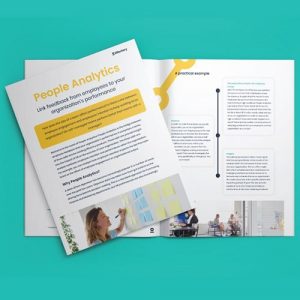It used to be that people who worked in human resources (HR), were the softies of social academics. Now, many HR managers working hard to be at the right-hand of the organisation. They substantiate their opinions, with data coming from HR analytics. They prefer to see themselves as “business partner” to the management. These HR managers are committed to uncovering which employees are lynchpins and which employees contribute most to the bottom-line using HR analytics. But lets come back a little on what is the purpose of HR analytics.
Purpose of HR analytics

I understand the enthusiasm of these HR managers. They see that their HR advice is finally taken seriously. They’re speaking the same language as the CEO and CFO and when possible, they’re sitting at the same table. I understand that appreciation feels good. But when all decisions made are based only on numbers in Excel spreads, without seeing the human side, an organisation becomes less personal. The human side is threatened. Even if you call it “people analytics”.
How to Use People Analytics in Your HR Strategy
Analytics in HR should not be leading
If analytics in HR are used to formulate policies for good employability or for establishing the organisation, that is perfect. I fully agree with that. But it becomes more dangerous when analytics in HR becomes a leader. When intuition and feelings are no longer used. When decisions are based purely on numbers, without even considering what you see and feel within the organisation.
When you want to know what’s happening in your organisation and what’s going to happen, the best way is to ask your employees directly. Ask them how they are doing. Take them seriously and give them space. Ask them what else can be improved, so they can perform better.
Create impact with People Analytics
Link feedback from employees to your organization's performance
DownloadPurpose through individual interests and social importance
Sustainably successful organisations not only consider the company’s interest, but also the individual interests of employees, and the social importance of their activities. Employees make the difference between organisations that are failing or succeeding. And the market and customers determine if you are relevant.
When the organisational, society and individual interests of employees align, energy is flows through. That’s when employees become the eyes and ears of the organisation. They become aware of where things can be better, and take initiatives to improve. By working with the organisation, they contribute to the social importance that long for. Organisations with positive energy are more customer-focused, creative and innovative. They work more efficiently and go further with their time, resources. And they have a greater ability to adapt to a changing environment.
Te role of HR management
Many organisations are under a lot of pressure to deliver good numbers every quarter. So they don’t always take the time to make the structural adjustments needed to modernise the organisation. They don’t take a moment to relax to celebrate successes. That’s when organisations continue to cling to their existing business model. They don’t consider of what customers want, with the changing of the times and the progress of technology. They give their employees the feeling like they do not matter. That they are just a means of achieving business results. These types of employees eventually lose their enthusiasm. They quit. Either by resigning or by mentally checking-out.
I find it difficult to see when HR is too closely tied to the CFO. Those kinds of HR managers forget their task: to keep the Board of Directors informed. It is precisely the role of HR management to raise awareness of the various interests that impact the organisation. To look beyond just the organisational interest, but to keep an eye on the individual and social importance. It’s not just the soft stuff. Its important business insight. Recognising that energetic and passionate employees bring so much more to the organisation. That’s why the drivers of workplace freedom must be concrete. These HR managers stand up to management if they see something wrong. That is not always easy. But it ensures that HR maintains a truly strategic role in making each organisation successful and future-oriented.
Book a free demo. See our solutions in action.
Effectory is Europe's Leading provider of Employee Listening Solutions. Schedule a product demo and discover how to enhance your employees' engagement.
Demo request
